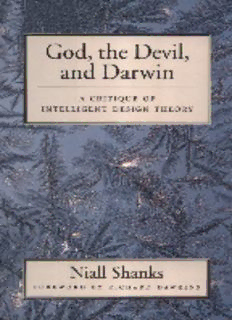
God, the Devil, and Darwin: A Critique of Intelligent Design Theory PDF
Preview God, the Devil, and Darwin: A Critique of Intelligent Design Theory
GOD, THE DEVIL, AND DARWIN This page intentionally left blank GOD, THE DEVIL, AND DARWIN A CRITIQUE OF INTELLIGENT DESIGN THEORY Niall Shanks 1 2004 1 Oxford NewYork Auckland Bangkok BuenosAires CapeTown Chennai DaresSalaam Delhi HongKong Istanbul Karachi Kolkata KualaLumpur Madrid Melbourne MexicoCity Mumbai Nairobi S˜aoPaulo Shanghai Taipei Tokyo Toronto Copyright #2004byOxford UniversityPress, Inc. Foreword copyright #2003by RichardDawkins PublishedbyOxfordUniversityPress,Inc. 198MadisonAvenue,NewYork,NewYork10016 www.oup.com OxfordisaregisteredtrademarkofOxfordUniversityPress Allrightsreserved.Nopartofthispublicationmaybereproduced, storedinaretrievalsystem,ortransmitted,inanyformorbyanymeans, electronic,mechanical,photocopying,recording,orotherwise, withoutthepriorpermissionofOxfordUniversityPress. LibraryofCongressCataloging-in-PublicationData Shanks,Niall,1959– God,thedevil,andDarwin:acritiqueofintelligentdesigntheory/NiallShanks. p.cm. Includesbibliographicalreferencesandindex. ISBN0-19-516199-8 1.Intelligentdesign(Teleology)2.Religionandscience.I.Title. BS651.S542003 213—dc21 2003042916 1 3 5 7 9 8 6 4 2 PrintedintheUnitedStatesofAmerica onacid-freepaper For My Dogs, Gnasher and Brutus This page intentionally left blank Foreword Who owns the argument from improbability? Statistical improb- abilityistheoldstandby,thecreakingwarhorseofallcreationists fromnaiveBible-jockswhodon’tknowbetter,tocomparativelywell- educated Intelligent Design ‘‘theorists,’’ who should. There is no other creationist argument (if you discount falsehoods like ‘‘There aren’t any intermediate fossils’’ and ignorant absurdities like ‘‘Evo- lution violates the second law of thermodynamics’’). However super- ficiallydifferenttheymayappear,underthesurfacethedeepstructure of creationist advocacy is always the same. Something in nature—an eye,abiochemicalpathway,oracosmicconstant—istooimprobableto have come about by chance. Therefore it must have been designed. A watchdemandsawatchmaker.Asagratuitousbonus,thewatchmaker conveniently turnsoutto be the Christian God(orYahweh, orAllah, or whichever deity pervaded our particular childhood). That this is a lousy argument has been clear ever since Hume’s time, but we had to wait for Darwin to give us a satisfying replace- ment. Less often realized is that the argument from improbability, properly understood, backfires fatally against its main devotees. Con- scientiouslypursued,thestatisticalimprobabilityargumentleadsusto aconclusiondiametricallyoppositetothefondhopesofthecreationists. There may be good reasons for believing in a supernatural being viii FOREWORD (admittedly, I can’t think of any) but the argument from design is emphatically not one of them. The argument from improbability firmly belongs to the evolutionists. Darwinian natural selection, which,contrarytoadeplorablywidespreadmisconception,isthevery antithesis of a chance process, is the only known mechanism that is ultimately capable of generating improbable complexity out of simplicity. Yet it is amazing how intuitively appealing the design inference remains to huge numbers of people. Until we think it through...which iswhereNiall Shanks comesin. Combining historical erudition with up-to-date scientific knowl- edge, Professor Shanks casts a clear philosopher’s eye on the murky underworld inhabited by the ‘‘intelligent design’’ gang and their ‘‘wedge’’ strategy (which is every bit as creepy as it sounds) and explains, simply and logically, why they are wrong and evolution is right. Chapter follows chapter in logical sequence, moving from historythroughbiologytocosmology,andendingwithacogent and perceptive analysis of the underlying motivations and social manip- ulation techniques of modern creationists, including especially the ‘‘Intelligent Design’’ subspecies of creationists. Intelligent design ‘‘theory’’ (ID) has none of the innocent charm ofold-style,revival-tentcreationism.Sophistrydressesthevenerable watchmaker up in two cloaks of ersatz novelty: ‘‘irreducible com- plexity’’ and ‘‘specified complexity,’’ both wrongly attributed to recent ID authors but both much older. ‘‘Irreducible complexity’’ is nothing more than the familiar ‘‘What is the use of half an eye?’’ argument,evenifitisnowappliedatthebiochemicalorthecellular level. And ‘‘specified complexity’’ just takes care of the point that any old haphazard pattern is as improbable as any other, with hind- sight. A heap of detached watch parts tossed in a box is, with hindsight, as improbable as a fully functioning, genuinely compli- cated watch. As I put it in The Blind Watchmaker, ‘‘complicated thingshavesomequality,specifiableinadvance,thatishighlyunlikely tohavebeenacquiredbyrandomchancealone.Inthecaseofliving things, the quality that is specified in advance is, in some sense, ‘proficiency’;eitherproficiencyinaparticularabilitysuchasflying,as an aero-engineer might admire it; or proficiency in something more general, such as the ability to stave off death....’’ Darwinism and design are both, on the face of it, candidate explanations for specified complexity. But design is fatally wounded FOREWORD ix by infinite regress. Darwinism comes through unscathed. Designers mustbestatisticallyimprobableliketheircreations,andtheytherefore cannot provide an ultimate explanation. Specified complexity is the phenomenon we seek to explain. It is obviously futile to try to ex- plain it simply by specifying even greater complexity. Darwinism reallydoesexplainitintermsofsomethingsimpler—whichinturnis explained in terms of something simpler still and so on back to primeval simplicity. Design may be the temporarily correct expla- nationforsomeparticularmanifestationofspecifiedcomplexitysuch as a car or a washing machine. But it can never be the ultimate explanation. Only Darwinian natural selection (as far as anyone has ever been able to discover or even credibly suggest) is even a can- didate as an ultimate explanation. It could conceivably turn out, as Francis Crick and Leslie Orgel once facetiously suggested, that evolution on this planet was seeded by deliberate design, in the form of bacteria sent from some distant planetinthenoseconeofaspaceship.Buttheintelligentlifeformon that distant planet then demands its own explanation. Sooner or later, we are going to need something better than actual design in order to explain the illusion of design. Design itself can never be an ultimate explanation. And the more statistically improbable the specified complexity under discussion, the more unlikely does any kind of design theory become, while evolution becomes correspond- ingly more powerfully indispensable. So all those calculations with which creationists love to browbeat their na¨ıve audiences—the mega-astronomicaloddsagainstanentityspontaneouslycominginto existence by chance—are actually exercises in eloquently shooting themselves in the foot. Worse, ID is lazy science. It poses a problem (statistical improb- ability) and, having recognized that the problem is difficult, it lies downunderthedifficultywithouteventryingtosolveit.Itleapsstraight from the difficulty—‘‘I can’t see any solution to the problem’’—to the cop-out—‘‘Therefore a Higher Power must have done it.’’ This wouldbedeplorableforitsidledefeatism,evenifwedidn’thavethe additionaldifficulty of infiniteregress. Tosee how lazy and defeatist itis,imagineafictionalconversationbetweentwoscientistsworking onahardproblem,sayA.L.HodgkinandA.F.Huxleywho,inreal life, won the Nobel Prize for their brilliant model of the nerve impulse.
Description: